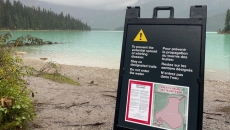Safety concerns have prompted the Canadian Coast Guard to make what is says is the "difficult decision" to end staffing at two lighthouses along British Columbia's coast.
Fisheries and Oceans Canada says "aids to navigation" will continue operating at both the Carmanah Point and Pachena Point light stations located along the Vancouver Island coast that's also home to the famed West Coast Trail.
The light keepers will move out of the buildings before winter weather arrives.
The department says a geotechnical investigation and hazard assessment found the land beneath "many" of the buildings at the two stations is not stable enough to meet the coast guard's requirements and some facilities are no longer safe to use.
It says the federal government is looking at long-term possibilities, including the potential costs of stabilizing the sites or moving buildings to safer ground, but those options are expected to be complex and may be cost-prohibitive.
The department says in a statement that the coast guard will continue to operate navigational aids at both sides using solar power and automated technologies.
The light keepers will be offered positions at other sites or within the coast guard.
There are 25 other staffed lighthouses along B.C.'s coast.






